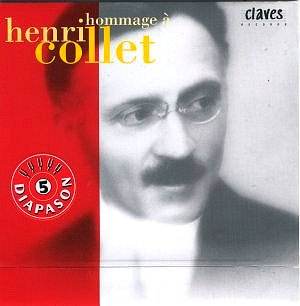Bonnet and Spain - a case of love at first sight. Bonnet,
born in 1885, began his donkey-back wanderings (à la Stevenson)
in Spain at the age of eighteen. He collected folksongs and impressed
Felipe Pedrell and Don Federico Olmeda sufficiently for them to
support his appointment as professor at the Casa Velasquez. Compositions,
both original and folk arrangements emerged. De Falla praised
them highly indeed especially the songs.
There are forty songs on the first disc all taken by
Rachel Yakar who has one of those darker-aureoled soprano voices that
well suits this repertoire. There is plenty of character here and Yakar
is the one to bring it out. Scorn, eagerness, sweetness (try Religiosa
tr 3) brazen it out with Cubana’s haughtiness and we cross over
into Canteloube territory in Bolero (tr 4). The Burgos
songs are more subtle including the sensuous Cancion de Novia (tr
7) with its call Lindamente canta. The Cantos de Castilla
are not at all impressionistic - more a case of high romance with
a measure less subtlety than Granados's Goyescas. These songs
have a high-stepping cavalry vigour as well as speaking of the idle
relaxation of the salon. Brashness barks the shins of raindrop romance.
Collet is a heart-on-sleeve man - never satirising - always in sympathy
with his subject.
Collet's orchestral works are sumptuously sampled on
the second volume. It will be clear from the timing and apparent from
the brevity of the songs that Collet is not prone to meandering. These
are compact three movement concertos neither of which runs more than
25 minutes. The symphony is in four movements. Every one of the movements
carries a Spanish title descriptive of dance (e.g. Fandango -
the last movement of the piano concerto) or place (Calles de Sebiya
- first movement of the violin concerto).
While the melodic line of the violin concerto apes
Bruch and maybe Saint-Säens’ Caprice Andalou the setting
is all shimmer with searing Iberian trumpets. Havanaise meets
the Elgar in the broad El Desgraciado. The Sevillana finale
is a blast of spiccato and Paganinian double-stopping accelerating into
feria style bombast. The castanets, also used in the first movement,
return at the end. The high calorie symphony has four movements against
the three for the two concertos. The hyper-coloured music has the modern
sensibility of travelogue film music. The Piano Concerto offers the
listener scorching trumpet lines, castanets and ripe Mediterranean hallmarks.
It would go well, as would all three orchestral works, in a concert
with a Spanish theme. These are not profound works. Rather we are in
the world of distinctive light music like Ron Goodwin’s Beatles Concerto
or any one of the cadre of works that also includes Malcolm Arnold’s
Concerto for Phyllis and Cyril.
The booklet for the songs disc has the words printed
in Spanish (as sung) and in French although not side by side. The extensive
notes are in French, Spanish, German and English.
These recordings have been languishing largely unattended
since 1995 and 1998. I have been pleased to make the acquaintance of
this finely performed music. Here is another splendid example of the
French feeling for Iberian culture in music. Collet is more than the
music critic who in 1920 (Comoedia 16 and 23 Jan 1929) dubbed a group
of Parisian based composers 'Les Six'.
Collet is no dazzling genius but he writes music that
is highly skilled and easy on the ear even if his ideas that are not
grippingly memorable. The orchestral works will neither enrage nor enrapture.
Pleasing, romantic and unassuming.
Rob Barnett

